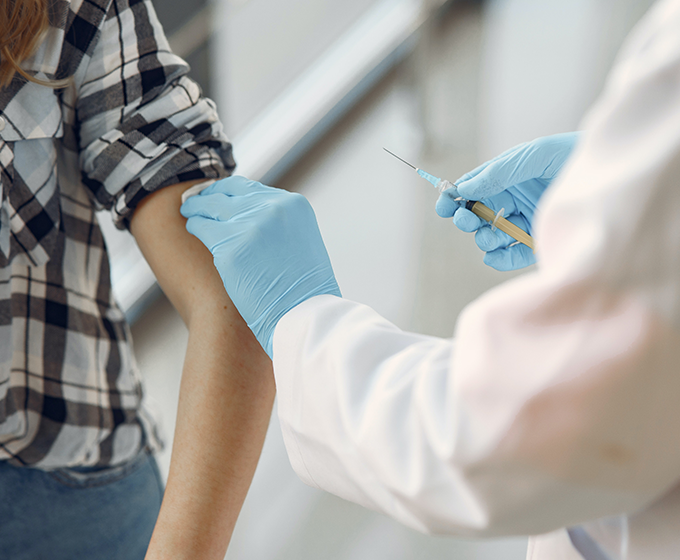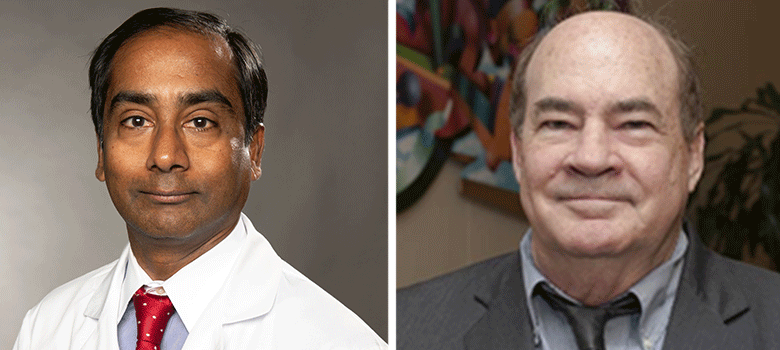
NOVEMBER 9, 2021 — Editor’s note: This op-ed by Bernard Arulanandam, immunologist in the Department of Molecular Microbiology and Immunology and vice president for research, economic development, and knowledge enterprise; and Neal Guentzel, microbiologist in the Department of Molecular Microbiology and Immunology; originally appeared in the San Antonio Express-News.
As long as SARS-CoV-2 continues to circulate—and individuals refuse to immunize themselves to prevent transmission and the onset of new coronavirus variants—additional shots, whether they be called part of a vaccine series or boosters will likely be required, particularly for those who are most vulnerable.
The ongoing debate about COVID-19 vaccine boosters centers on adaptive or acquired immunity, which includes the body’s specific learned responses against disease agents.
The waning of the antibody responses to current COVID vaccines suggests diminished protective immunity against the SARS-CoV-2 virus without a booster shot.

Immunologist Bernard Arulanandam and microbiologist Neal Guentzel of UTSA penned this op-ed for the San Antonio Express-News.
Given this reality and the global interconnectedness that impacts us all, our nation’s medical community is considering several questions:
Many vaccines, like those for COVID-19, work through B-cells by creating a comprehensive system of antibodies that protect the body from disease agents like viruses and frequently their variant forms. These “neutralizing” antibodies prevent disease-causing microbes and their toxic products from binding, as through the spike protein on SARS-CoV-2, the virus that causes COVID-19, to receptors on the body’s target cells. These vaccines also produce longer lived protective “memory” B-cells that learn and mature through a series of random and beneficial mutations.
Over time, however, and particularly with increasing age and other immune-compromising circumstances, the body’s response to a vaccine decreases and an added dose of a vaccine is necessary to boost the immune system. This booster strengthens the body’s ability to continue to fight off infections.
Getting a scheduled vaccine series that includes boosters is already a well-documented regimen globally to fight a variety of infectious diseases. Hepatitis B vaccine, for example, is currently administered to newborns at birth. Two subsequent doses are administered at ages 1 to 2 months of age, and 6 to 18 months. This vaccination regimen creates significant long-term immunity against the Hepatitis B virus and ensuing liver disease.
Research clearly shows that one dose of the measles vaccine isn’t enough to protect against this disease. Lifelong immunity against measles is conferred only after a two-dose regimen. Long-term immunity, the kind needed for the best possible protection against diseases, requires the continued presence of protective antibodies through long-lived memory B-cells. Scientists call this maintenance of immunological memory.
The current debate over the COVID vaccine booster further fuels the need for additional research insights to identify new markers that better predict vaccine durability.
UTSA Today is produced by University Communications and Marketing, the official news source of The University of Texas at San Antonio. Send your feedback to news@utsa.edu. Keep up-to-date on UTSA news by visiting UTSA Today. Connect with UTSA online at Facebook, Twitter, Youtube and Instagram.
Move In To COLFA is strongly recommended for new students in COLFA. It gives you the chance to learn about the Student Success Center, campus resources and meet new friends!
Academic Classroom: Lecture Hall (MH 2.01.10,) McKinney Humanities BldgWe invite you to join us for Birds Up! Downtown, an exciting welcome back event designed to connect students with the different departments at the Downtown Campus. Students will have the opportunity to learn about some of the departments on campus, gain access to different resources, and collect some giveaways!
Bill Miller PlazaJoin us for an intimate evening of cocktails, conversation, and culinary inspiration with Pati Jinich, Emmy-nominated chef and James Beard Award-winning author. Enjoy light bites and signature drinks in the warm, modern setting of Mezquite as Pati connects with guests over her passion for Mexican cuisine and storytelling.
Mezquite Restaurant in Pullman Market, 221 Newell Ave., San Antonio 78215From inspired courses to thoughtful pairings and a rich sense of community, the Ven a Comer Signature Dinner is a night of shared meals, shared stories, and unforgettable flavor.
Stable Hall (Pear Brewery), 307 Pearl Pkwy, San Antonio 78215Come and celebrate this year's homecoming at the Downtown Campus with food, games, giveaways, music, and more. We look forward to seeing your Roadrunner Spirit!
Bill Miller PlazaThe University of Texas at San Antonio is dedicated to the advancement of knowledge through research and discovery, teaching and learning, community engagement and public service. As an institution of access and excellence, UTSA embraces multicultural traditions and serves as a center for intellectual and creative resources as well as a catalyst for socioeconomic development and the commercialization of intellectual property - for Texas, the nation and the world.
To be a premier public research university, providing access to educational excellence and preparing citizen leaders for the global environment.
We encourage an environment of dialogue and discovery, where integrity, excellence, respect, collaboration and innovation are fostered.